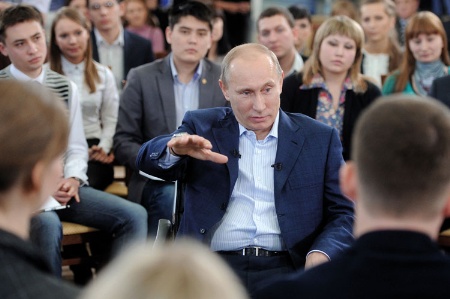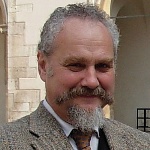Source: Getty montage
Russian universities are bit like collapsed stars - they are still giving off light, but what produced that light disappeared many years ago
At an astonishing 787ft (240m) tall, the vast tower of Lomonosov Moscow State University dominates the skyline of Russia’s capital.
Opened shortly after Stalin’s death in 1953, his “temple to Soviet science” remains the world’s tallest university building and can be seen by Muscovites for miles in every direction.
But while the tower – more than three times as high as London’s Senate House Library and Europe’s tallest building until 1990 – is awe-inspiring, today, the international standing of Russia’s universities does not reach such heights.
In the Times Higher Education World University Rankings 2014-15, Moscow State – Russia’s most prestigious and highest-ranked university – is 196th in the world, and occupied positions in the low 200s for the previous four years. Meanwhile, Russia’s oldest higher education institution, Saint Petersburg State University – the alma mater of eight Nobel laureates, dozens of world-renowned scientists and Russian president Vladimir Putin – did not break into the top 400, despite an illustrious history spanning almost 300 years. Siberia’s Novosibirsk State University, founded in 1959, is the only other Russian institution to make the top 400.
Some commentators have asked whether these results present a fair picture of their performance, arguing that much of the research published in the country’s 2,000 or so Russian-language journals goes unrecognised owing to the methodologies used to compile global league tables. They also point out that much high-quality research is located in institutes, such as the Russian Academy of Sciences, which is home to 45,000 researchers.
But many sector experts say that Russia’s low standing in league tables is warranted – and that it is the result of chronic underinvestment over decades, a dysfunctional system for encouraging academic talent and a complacent reliance on past Soviet glories in science.
“Russian universities are bit like collapsed stars – they are still giving off light, but what produced that light disappeared many years ago,” says the vice-rector at one Russian university, who asks not to be identified.
In an attempt to fix the problem, in 2013 Putin launched an ambitious plan, Project 5-100, that aims to place five Russian universities in the world’s top 100 by 2020. One of its key objectives is to ensure that at least 10 per cent of Russia’s academics and researchers and 15 per cent of its 7 million students come from abroad. The resources associated with this scheme are currently concentrated on 15 universities (out of 36 institutions that applied for grants in 2012), with more set to be cut out of the group each year in an X Factor-style elimination to decide the final five.
However, investment in Project 5-100 is relatively modest, with about 44 billion roubles (currently worth some £448 million) available for 2013-16. In comparison, Germany committed €1.9 billion (£1.4 billion) for the first stage of its Excellence Initiative (2006-2011) and France put €7.7 billion into plans to improve higher education, according to a European University Association report published in December.
Project 5-100’s international spending power has also been hit by the collapse in the rouble’s value amid falling oil prices and sanctions imposed by Western governments. With economists predicting that the country could be facing its first recession in five years, the present economic climate is likely to cripple efforts to recruit researchers from overseas.
Moreover, Russia’s pariah status in the wake of its sudden invasion and annexation of Crimea and warmongering in eastern Ukraine will also do little to help academia improve its international links.

Nonetheless, Alexander Povalko, deputy minister of education and science, believes that the 2020 goal is not a fantasy, despite warnings that creating world-class universities takes decades.
“The pace is quite high, but the target is achievable,” argues Povalko, who says that Russia is making faster progress on improving its rankings indicators than other countries. “Russia is traditionally very strong in some areas, such as physics, so we are not building something from scratch – the potential exists in universities to do very well,” he says.
One of the toughest parts of Project 5-100 is likely to be convincing international researchers, particularly émigré Russian scientists and young academics, to consider a career in Russia. But Povalko is confident that top talent from both Russia and abroad can be tempted to the sector.
“We are fighting for talent, no matter what their nation, alma mater or current affiliation,” he says. “This task is relatively easy: just create strong motivation by salary, comfortable environment, unique research equipment and fascinating career perspectives.”
In post-Soviet times, average salaries for academics have been lower than the average per capita income in Russia, with professors earning less than a professional holding a master’s degree. This has led to a massive brain drain – estimates indicate that approximately 80,000 scientists left Russia in the early 1990s alone – while not enough young Russians are entering academia to replace an ageing academic cohort, many of whom are nearing retirement. Some 26 per cent of university staff in Russia are now over the age of 60, according to 2012 figures from the Russian Federal State Statistics Service (Rosstat), compared with 9 per cent of UK university staff in 2012-13.
“We should create comfortable conditions for academics to live,” says Povalko. “Researchers need to be paid well, work in a pleasant college environment, have adequate healthcare and live in decent accommodation,” he says.
But bolstering low academic salaries is only part of the remedy for Russia’s ailing academy, Povalko adds. “People need to have a clear understanding of a career trajectory and that they will engage in interesting research, have good equipment and become part of major projects where their contribution is valued,” he continues.
Indeed, many believe that it is Russia’s academic system – still informed by outdated Soviet thinking – that is the major barrier to improvement, rather than just a lack of funding.
“Brilliant people, bad system,” is how Philip Altbach, director of the Center for International Higher Education at Boston College in the US and a member of the international advisory panel for Project 5-100, sums up. “Despite all Russia’s problems, academics are trained well, get really good jobs and are very productive outside their country,” says Altbach of the academics who leave. But, he adds, “the constraints on productivity and publications in many Russian universities are considerable”.
The lack of academic mobility is one of the major problems, with researchers often remaining at one university, usually their alma mater, for their entire career.
“You get your degree, you get a job and you never leave,” explains Altbach, who identifies this “academic inbreeding” as a major obstacle to establishing a vibrant research culture. “It is very difficult to move around the country as part of a normal career structure, which is very limiting to your chances of gaining promotion,” he says.
Under the Soviet system, this problem was largely resolved by requiring young researchers to undertake an obligatory placement at a university in the provinces. That gave institutions in far-flung parts of Russia the chance to attract bright young researchers, who often stayed on to become research leaders themselves – in part because they were unable to market their talents beyond the USSR.

Brilliant people, bad system. Despite all Russia’s problems, academics are trained well, get good jobs and are very productive outside their country
“That generation of academics is not young any more…and soon will no longer serve as the core of their research groups,” notes Maria Yudkevich, vice-rector at the Higher School of Economics (HSE) in a new book, Young Faculty in the Twenty-First Century, due to be published this year. “In general there are few economic or social incentives to move from Moscow and St Petersburg to accept an entry-rank position at a regional university,” she adds, observing that people would prefer to find a job outside the academic sector rather than move from these urban centres.
That low mobility between universities is exacerbated by a lack of transparent information about opportunities elsewhere, with external grants, fellowships and summer school places dependent on approval or recommendations from senior staff, says Yudkevich, who sees such practices as “discriminatory” to younger academics. Within this system, in which loyalty to professors is highly prized and reciprocated with offers of jobs or preferential treatment, “open” competitive hiring is widely seen as a charade; external candidates cannot compete with a well-connected PhD student from within the institution.
The lack of a peer-review culture is also damaging, adds Yudkevich. “All expertise and review processes are, in general, extremely personalised,” she says, adding that good relations with colleagues are needed to secure publication in local journals.
Establishing more open and trustworthy recruitment and promotion procedures will be a key plank in any efforts to resuscitate Russia’s “inbred” university system, but the underperformance of its existing research staff is perhaps the more pressing issue if Russia hopes to meet its 5-100 targets.
According to a Thomson Reuters report on the research outputs of G20 countries published in April last year, Russia’s 447,000 researchers published just 26,500 papers indexed in the Web of Science in 2013.
In contrast, Germany’s 328,000 researchers published nearly four times as many papers (about 95,000), slightly fewer than the UK’s 100,000 papers, produced by 262,000 researchers. Among Russia’s BRICS comparators, China’s researchers are more than twice as productive and South Africa’s more than four times so.
“Of course there is a language issue, but the incentives to publish are obviously not built into the system,” observed Ihron Rensburg, vice-chancellor of the University of Johannesburg, at THE’s BRICS and Emerging Economies Universities Summit, held in Moscow last month. Russia needs to find a way to manage those academics who are underperforming on research output, added Rensburg, who also advocates the publication of all research in English – a policy that has boosted Johannesburg’s research metrics.
Since the start of Project 5-100 and related reforms in 2012, revised academic contracts with financial rewards for performance have been introduced. While the salary increases of up to 40 per cent are long overdue, the conditions attached to them have not been embraced by many scholars.
“So we are paid more but we need to work twice [as hard]: classes, publications, applicants,” said one scholar quoted in a study by Ivan Pavlyutkin, associate professor of sociology at HSE, who interviewed top-level administrators and academic leaders at eight Russian universities. Others felt the performance-related element of the pay was so small that teachers might opt out of extra work, according to Pavlyutkin’s paper, published last autumn in HSE’s newsletter, Higher Education in Russia and Beyond. “Do you think 2,000 roubles [about £20] can be recognised as a real stimulus for such an amount of additional work?”, asked another academic of what he called “pin money”.
Yet such policies are required to reward academics who produce internationally recognised research, believes Yudkevich, as otherwise, “people tend to publish in local journals, which (in many cases) are not peer-reviewed and are quite often of poor quality”. She believes that more grants must also be made available for academics to attend conferences at other universities. “The entire presentation experience of some faculty often consists of presentations at local conferences organised by the home university with little or no competition for being selected to present a paper,” she notes.

Other major structural changes may also have an effect on the performance of Russia’s higher education sector. Dozens of what Povalko calls “poor quality” higher education institutions that were “toxic to the system” were closed or merged with other universities last year.
In the case of Plekhanov Russian University of Economics, its student body rose from about 13,000 students, mainly in Moscow, to 60,000 students across Russia and beyond after it was merged with the lower-ranked Russian State University of Trade and Economics in 2012.
To improve educational standards, Plekhanov has introduced a single curriculum for its 33 branch campuses, including those in Siberia, St Petersburg, Uzbekistan and Mongolia. “Some of the branches did not take it too well because they had a lot of freedom before,” says Leonid Bragin, Plekhanov’s vice-rector. Following the changes, local institutions will still control 30 to 45 per cent of the curriculum.
Reminders of Plekhanov’s Soviet past loom large throughout the institution. At the institution’s main entrance, a flame burns day and night on a prominent monument to Russia’s war dead – a link to the university’s time as a bandage-making factory, whose production lines were manned by scholars, including the rector himself.
Statues of revolutionaries killed in the October uprising of 1917 can also be found in the museum of the university, once named after Karl Marx, while memorials to the pre-Soviet industrialists who founded the institution are dotted around the campus.
However, there are also signs of a more modern student-focused university. In the lobby, a DJ is playing dance music, student society members are handing out fresh fruit to promote healthy eating as part of a campus health initiative, and display cabinets exhibit a multitude of Plekhanov sporting triumphs.
Plekhanov actively “uses online systems” to stream lectures to students across the campuses, says Bragin, while the university takes its responsibility to monitor standards across its branches “very seriously”. Since the merger, he adds, new funds have been made available to refurbish much of its central Moscow campus, build a new swimming pool and accommodation centre and upgrade its teaching facilities.
So will the modernisation of Russian universities work? Can higher education institutions in the former Soviet state really embrace a new US-style model of university management, based on the needs of students, competitive research funding and performance-related pay?
On top of this, a host of new challenges have arisen in recent months following the collapse of the price of oil and gas, resources that account for 50 per cent of Russia’s federal budget.
“I hope funding for the 5-100 project persists, even if government budgets are tightened,” says Timothy O’Connor, vice-rector of academic affairs at Moscow’s National University of Science and Technology. “A fundamental change of culture takes a long time; otherwise initiatives are ephemeral and not long-lasting,” he adds.
Investment in universities is vital if Russia wants to avoid similar oil-price related financial crises in future, O’Connor argues. “One of the major goals is to make Russia less dependent on commodities and build an innovative, knowledge-based economy.”
To many, however, the prospect of the wounded Russian bear – assailed by financial crises and economic sanctions – finding the resources and the willpower to revive its once-great academy looks increasingly doubtful.
Life under Putin: employed today, fired tomorrow

The jailing of members of punk protest group Pussy Riot, the murder of journalists and the state’s grip on news media have fuelled continuing concerns over freedom of speech in Putin’s Russia.
Freedom House, a US-based human rights watchdog, rates Russia’s record on civil liberties, political rights and overall freedom as “poor”. It adds that “academic freedom is generally respected” but “the education system is marred by corruption and low salaries”.
The sacking of two scholars critical of Russia’s 2014 invasion of Crimea has recently attracted criticism.
In March, Andrei Zubov (above), a professor of history at the Moscow State Institute of International Relations, was fired after writing an opinion piece published on the website of the newspaper Vedomosti. In his criticism of Russian actions in Crimea, he likened Putin’s actions to those of Hitler. The institute accused Zubov of making “inappropriate and offensive” historical analogies, alleging that his statements were harming its teaching environment.
The Scholars at Risk network has also criticised the treatment of Mikhail Savva, professor of political science most recently at Kuban State University in Krasnodar, who was handed a three-year suspended sentence for “fraudulent use of government funds”.
Savva, who was held in custody from April to December 2013 and under house arrest until his trial in April last year, was quizzed extensively about his work with the US-funded non-governmental organisation, the Southern Regional Resource Center (SRRC), which focuses on inter-ethnic issues.
Savva denies the charges against him.
Jack Grove
Register to continue
Why register?
- Registration is free and only takes a moment
- Once registered, you can read 3 articles a month
- Sign up for our newsletter
Subscribe
Or subscribe for unlimited access to:
- Unlimited access to news, views, insights & reviews
- Digital editions
- Digital access to THE’s university and college rankings analysis
Already registered or a current subscriber? Login





